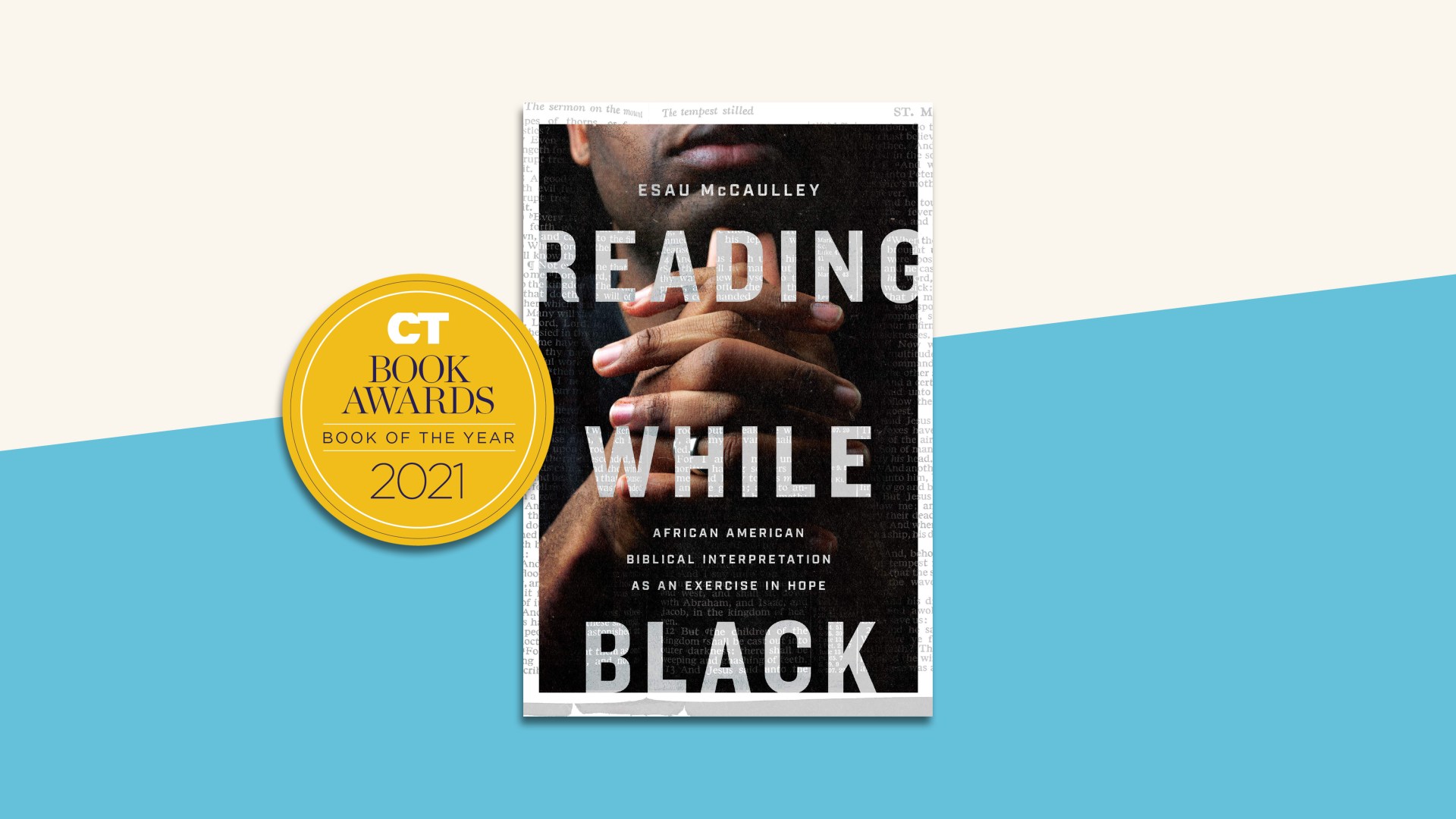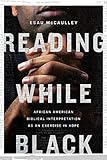An excerpt from CT’s Beautiful Orthodoxy Book of the Year. Here is the full list of CT’s 2021 Book Award winners.
Reading While Black: African American Biblical Interpretation as an Exercise in Hope
IVP Academic
208 pages
$12.99
I was eight years old the first time someone called me a nigger. It happened in elementary school one morning when I started to feel sick. I was in bad enough shape to call my mother at her factory job at Chrysler.
I dutifully went to the school office, where they dialed the number on the emergency contact card and handed me the phone. Nervously, I asked to speak with Laurie McCaulley, but the man on the other line said I had the wrong number and abruptly hung up. We tried calling a second time, but the same man replied with something like, “I told you that you have the wrong number. . . . Can’t you niggers even use the phone?”
I was aware of my blackness before that phone call, but it was wrapped in the soothing warmth of normalcy. My church was black; my school was black, and my sports teams were black. When we cleaned our home, black soul music played in the background. On the phone that morning, I experienced my blackness as the object of derision. I recall the rage building alongside my awareness of powerlessness. I had been emotionally assaulted, but there was no way to respond.
Black children collect these slights as they navigate the cities and towns, the highways and back roads of these United States. The anger grows, and we often have no place to put it, so we turn to the closest thing at hand. We harm each other and violently demand the respect of our black friends and neighbors because we are hounded by disrespect in white spaces. I grew up around black men who hit black women, and I was helpless to stop it. The rage grew. I was mad at white people. I was mad at my own people. I was infuriated by my own helplessness.
The history of black people in this country is a litany of suffering. As far back into America’s story as we want to go, we will see the heavy boot of white supremacy stepping on the backs of black women and men. What can we do with our anger, our pain? How does Christianity speak to it? What does the cross have to say, not simply to human suffering but to the particular suffering of African Americans?
The Cross Breaks the Wheel
Let me be clear: The cross of Jesus Christ is not an intellectual apologetic that explains away the whip and chain as instruments of God’s larger purposes. We do not believe that our slavery was intended for America’s salvation. We do not hold to some broken and distorted application of Joseph’s story (Gen. 50:19–21). No, what happened to the enslaved and their descendants was and remains an unmitigated evil.
But how does God respond to our cries? Not with facile appeals to free will—that some people will abuse it and do evil things like slavery. Nor does he respond as he did to Job, merely by revealing his sovereign glory and silencing our questions and complaints.
What is God’s first answer to black suffering (and the wider human suffering and the rage that comes alongside it)? It is to enter it alongside us as a friend and redeemer. The answer to black rage is the calming words of the Word made flesh. The Incarnation that comes all the way down, even unto death, has been enough for us to say yes, God, we trust you.
We trust God because he knows what it means to be at the mercy of a corrupt state that knows little of human rights. Rome and the antebellum South may not be twins, but they are definitely close relatives. On the cross we meet a God who experienced injustice in the flesh, and who knows the plight of innocent sufferers around the world.
But what reaches out and grabs the heart of the black Christian is not simply that Christ was innocent of the charges levied against him. If that were the full message of the Cross, Jesus would merely be another in a long line of martyrs. Jesus stands out as the truly innocent sufferer who had done nothing wrong.
We are not slave owners. Nonetheless, we have participated in the harm of others, in ways large and small. The results have come back from the analysis of the human condition, and the data is clear: We are all sinners. Jesus is not. The Christian tradition says that the innocent one suffered for us individually and corporately to bring us to God (Gal. 2:20; Rom. 4:25). It is only by looking at our enemies through the lens of the Cross that we can begin to imagine the forgiveness necessary for community. What do black Christians do with the rage we rightly feel? We send it to the cross of Christ.
If you dig deep enough into the past of any person or group, you will find wrong. As Paul expressed it: “All have sinned and fall short of the glory of God” (Rom. 3:23). It is only by remembering that God’s forgiveness costs him something that I find the divinely given power to pay the cost of forgiveness instead of revenge. The sword gives birth to the sword, but the cross breaks the wheel.
This dynamic is not unique to the African American context; is it also the story of first-century Israel. Jesus came into a world in which his fellow Jews had every reason to be angry at Rome. They were an occupied country—overtaxed, exploited, and subject to all the indignities of colonial rule. Nonetheless, these early Jewish Christians, who had all the historical ammunition needed to seek the ruin of their Gentile oppressors, made it their mission to convert a largely hostile Roman world.
This call to transform rage into love and forgiveness can be misheard as justifying continued abuse and acquiescing to mistreatment. But the theological energy of the Bible is toward liberation. The Exodus speaks of freedom from slavery, and the New Testament speaks of freedom from sin. God does not intend for his people to remain in bondage forever.
Further, the New Testament calls on believers to help those who are suffering. According to James, a “pure and faultless” religion “is this: to look after orphans and widows in their distress and to keep oneself from being polluted by the world. (1:27). How could we offer victims of abuse anything less than the end of their suffering when we have the power to grant it? James does not say, “Tell the orphans and the widows to put up with suffering.” He says to the Christian, “Help them!”
The Final Vindication
It would be dishonest to say that the Cross’s answer to evil is always emotionally satisfying. Looking at the present and the historic suffering of my people, there are times I feel closer to Psalm 137 (“Happy is the one who repays you according to what you have done to us”) than Luke 23:34 (“Father, forgive them”).
It is precisely when anger reigns in my heart that I must remember the Resurrection. Without it, the forgiveness embedded in the cross is the wistful dream of a pious fool. But I am convinced that the Messiah has defeated death. I can forgive my enemies because I believe the Resurrection happened. I am convinced the God who had the power to judge me did not. Instead he invited me into communion with his Son, and through that union I discover the resources to love that I did not possess before.
But more than that, the Resurrection is the final vindication of all black hopes and dreams. If black anger arises from the disregard of black bodies, then resurrected black bodies are God’s ultimate affirmation of our value. When God finally calls the dead to life, he calls them to life with their ethnic identity intact (Rev. 7:9).
One day, God will judge all wickedness. This is both comforting and terrifying. It makes me long for everyone to take advantage of God’s offer of forgiveness in Christ. Christian eschatology breeds compassion. Many years into my Christian life I still feel the anger, but the Cross and the reality of God’s power have changed me. I want the oppressor to repent and find healing. I want him or her to be free as well.
Adapted from Reading While Black by Esau McCaulley. Copyright © 2020 by Esau McCaulley. Used by permission of InterVarsity Press, P.O. Box 1400, Downers Grove, IL 60515-1426. www.ivpress.com











